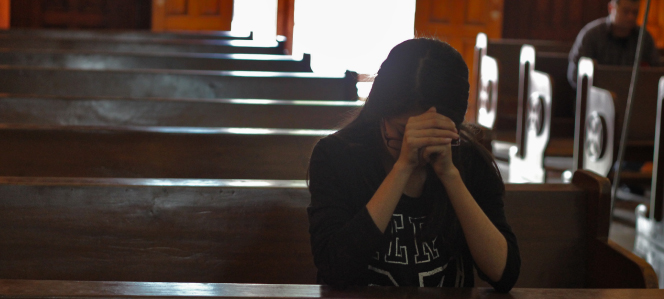I remember the first time that I went into the confessional. I was converting to Catholicism and the whole concept was foreign to me. The confessor had no idea that it was my first time. I sat behind the screen and divulged my sins.
That was in 2008, and since then, I have gotten a bit more courageous. I confess deeper sins. I sit face to face with my confessor. I confess why I have sinned and not just the sin itself. Confession has become fuller for me and I hope it will continue to do that for the rest of my life.
I have been reading Love and Responsibility and was especially moved by “the absorption of shame by love.” St. Pope John Paul II (then Karol Wojtyła) speaks of this in relation to sexual shame. He says, “Shame is…swallowed up by love, dissolved in it.”
I think we have all experienced this not only in relation to sexual shame but in other ways—shame from making the wrong choice or disobeying a rule, shame from not feeling like we fit in, shame from feeling like we are less than what we are, which is the likeness of God himself. When this shame is met with the love of God, it is absorbed. It is not eliminated per se but absorbed. An element of shame still exists to continue to awaken our conscience when we are tempted to degrade ourselves into something less than a beloved child of God.
Now, why mention confession before talking about shame? There’s a particular absorption of shame that happens in the confessional. In Theologie der Geschlechter (Theology of the Sexes [or Gender]), Adrienne von Speyr compares the conjugal act with the sacraments of Reconciliation and the Holy Eucharist.
Von Speyr writes that, like the conjugal act, both parties must say yes (or consent) to the act, and through the sacrament of Marriage, this act is perfected through grace. The husband and wife are then fully present to one another and two flesh become one. Ultimately, whatever sexual shame they carry is absorbed through this love.
Now, so goes confession. The confessor and penitent must be willing to participate fully in the sacrament of Reconciliation. The confessor must fully give himself as he is in persona Christi (in the person of Christ), while the penitent must come with a contrite heart. During confession, the penitent, in shame, comes before the confessor to reveal their sins, and that shame is absorbed into the love of Christ.
Von Speyr wrote: “A marital act is as good as true devotion is realized in it, receiving communion is as good as a man makes himself submissive to the Lord; he becomes more unworthy as he refuses compliance.” Couldn’t this be likened to the penitent making a good confession or even the confessor receiving the sins with mercy and love, offering absolution and grace?
“If spouses perform the conjugal act only swiftly, superficially, and habitually, without wanting to receive it inwardly, this does not reveal a view worthy of the Sacrament.” Could the same thing be said of those who confess? Do we go to confession as an Advent or Lent “to do” on our long list of errands? Do we enter the confessional hastily confessing the sins in and of themselves without any reflection on the root cause or the reoccurrence? Is going to confession a bi-weekly habit or is it an avenue to receive an infusion of sacramental grace from our merciful God?
This cannot only be examined in the heart of the penitent but also in the heart of the confessor. I’m sure we have all been to a “bad confession.” I had a priest respond to texts during a confession once! While this does not discount our absolution or the state of grace that we enter into, it certainly leaves us feeling emptier than before we confessed and perhaps even more full of shame. We must pray not only for our hearts to be contrite but for our beloved priests to receive us fully, acting in persona Christi so that our shame may be fully absorbed in the love of Christ.
In the sacrament of Reconciliation, I firmly believe that we receive much more than we could ever imagine. Let us enter into the act of confession fully contrite, fully giving ourselves into the love of God, and pray that our priests continue to give absolution with the heart and mind of our merciful and loving God. May our shame be absorbed in his unfailing love.
